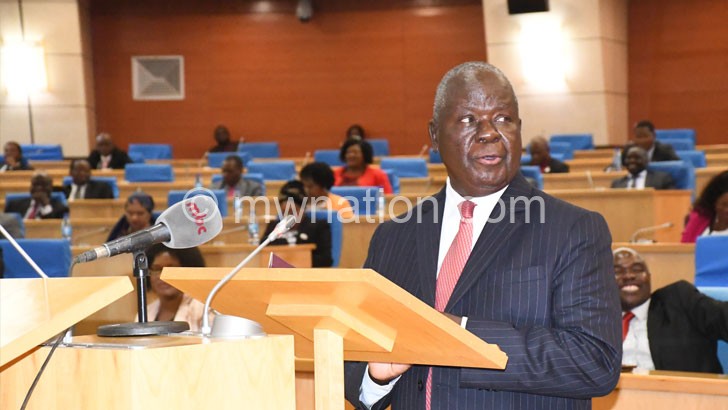Economists caution Mlusu on borrowing
Economic experts have cautioned the new Finance Minister Felix Mlusu against excessive borrowing to finance the government budget saying borrowing should only be for production and not perpetually for consumption if the economy is to achieve remarkable recovery and growth.
The caution comes after noting that Mlusu’s K722 billion 2020/21 provisional budget that Parliament authorised on Thursday has a deficit of K209.5 billion that will be financed through borrowing.

Malawi Economic Justice Network (Mejn) executive director Bertha Phiri said in a written response on Tuesday that it is worrisome that the provisional budget deficit is extremely not encouraging.
She said: “Government continue to borrow alongside other huge debts. Borrowing even within a provisional budget arrangement is a sign that our economy is not growing. It is almost the same percentage with the just withdrawn budget, K209.5 billion out of K722 billion total budget”.
Going forward she said Mejn would be interested to learn how the new government will devise mechanism to finance the current huge deficits apart from borrowing.
Economics lecturer at the Polytechnic, a constituent college of the University of Malawi Betchani Tchereni said borrowing should be for developmental aspects more than in recurrent.
He said Government borrowing may lead to distabilised macroeconomic fundamentals which calls for responsible borrowing that increases the tax base and leads to self economic sustainance.
He said: “We need to be sure that we are borrowing sustainably, in other words, we need cheaper and affordable loans even on the domestic scene.
“We have to work hand in hand with the Ministry of Economic Planning and Development then make sure that there is growth in industry to enhance taxation which then can pay off. So borrowing to increase in investment is alright”.
Centre for Research and Consultancy executive director Milward Tobias said borrowing is inevitable especially now that tax revenue has drastically gone low due to subdued the business environment and reduced international trade.
He however emphasised that borrowing must finance production not consumption saying government should prefer external borrowing and has a long grace period, brings foreign exchange and crowds in private sector.because it has low interest rates
“Going forward, the main budget to be presented later should define the development model the new government wants to follow. We should transition from persistent deficit budget to zero-deficit and eventually surplus budget.
“We should graduate from a low value factor-based economy to high value efficiency and eventually innovation based economy. The projects the budget is financing are what will tell whether we are transitioning or not,” said Tobias.
He called for the need to embrace a culture of evidence based decision-making saying for instance, by increasing tax free bracket from K45 000 to K100 000, how much revenue in total is government foregoing and inadvertently how much more liquidity is in people’s pockets.
He said this will help to estimate multiplier effects and the extent to which that may improve, maintain or distort fiscal and monetary policy convergence.
Centre for Financial Inclusion and Literacy Consultancy executive director Abel Mwenibanda urged the government to avoid excessive and unnecessary borrowing as the practice may lead to a crowd out effect in terms of domestic borrowing and also increase debt burdens on foreign borrowing.





